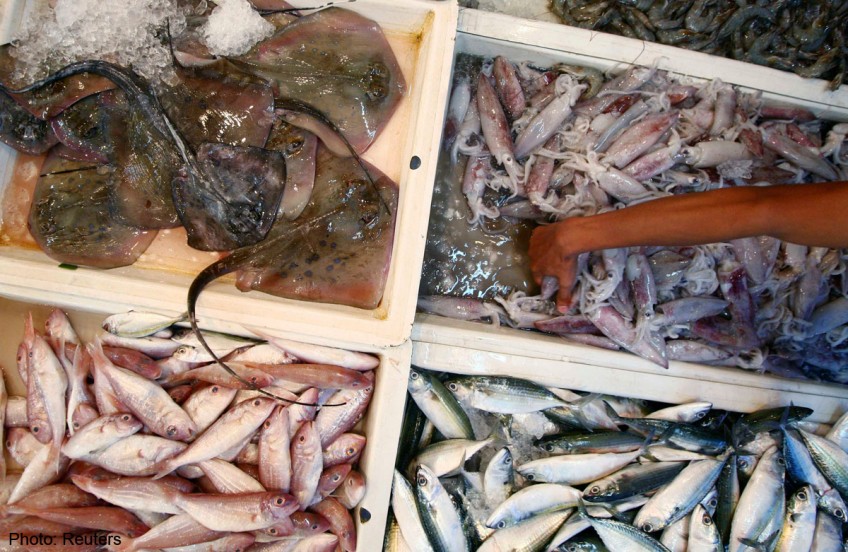Get a taste of sustainable seafood

The first Sustainable Seafood Festival will kick off in Singapore on June 8, in an effort to raise awareness among seafood-loving Singaporeans on how to consume it responsibly.
The week-long festival, organised by World Wide Fund For Nature (WWF) Singapore and the Marine Stewardship Council (MSC), will give consumers the chance to buy and eat seafood from supermarkets, suppliers and restaurants which have been supplied by seafood suppliers awarded the Chain of Custody by the MSC. It is a standard of traceability to ensure that consumers and buyers know that the fisheries deal in sustainable seafood.
Ms Elaine Tan, 47, the chief executive officer of WWF Singapore, says: "Singapore is one of the biggest seafood consumers in the Asia-Pacific region, devouring more than 140 million kg a year. If we continue consuming the ocean's resources at this rate, it is estimated that stocks of all species now fished for food will collapse by 2048."
The WWF says Singapore imports more than 90 per cent of its seafood. Most of this comes from the Coral Triange, an area near the waters of Indonesia, Malaysia, Papua New Guinea, the Philippines, Solomon Islands and Timor Leste. Overfishing is common here.
Restaurants participating in the festival, which starts on World Oceans Day, are Absinthe Restaurant Francais, Italian restaurant Gattopardo Ristorante di Mare, Glow Juice Bar & Cafe, Italian restaurant il Cielo, Oscar's at Conrad Centennial Singapore, Seasons Bistro, The Pelican Seafood Bar & Grill and Shangri-La Rasa Sentosa's all-day dining restaurant, Silver Shell Cafe.
Some of them are not new to serving sustainable seafood, such as The Pelican Seafood Bar & Grill at One Fullerton.
Its head chef Isaac Tan, 42, says: "We have always been a supporter of sustainable seafood. We are open to a lot of options on using other sustainable seafood products, such as prawns and even Pacific dory."
About 30 to 40 per cent of the Pelican's regular menu features sustainable seafood and, for the festival, he has increased it to 80 per cent.
He has created dishes featuring sustainable seafood, including the Pan-roasted Toothfish, also known as the Chilean sea bass, priced at around $45, which is sustainably sourced from South Georgia in the United Kingdom.
Other dishes created around sustainable seafood include the Salmon Tartare served with Watermelon, Marjoram and Raspberries Vinaigrette (from $33) at il Cielo and Australian King Prawns served with Mango Salad and Palm Sugar (from $18) from Glow Juice Bar & Cafe, both at Hilton Singapore.
Supermarket chain Cold Storage will provide sustainable seafood products at selected outlets. It first started carrying sustainable seafood in 2011 at its Jelita store.
Seafood suppliers such as Indoguna and Lee Fish will also take part in the festival and have been certified with the Chain of Custody by the MSC. The council helps in promoting sustainable fishing practices and also develops standards for sustainable fishing and seafood traceability.
Mr Jason Chong, 33, the head of corporate communications at Indoguna, says sustainable seafood is 15 to 20 per cent more expensive than non-sustainable seafood.
When asked about the price difference, Mr Kelvin Ng, 42, the Asia-Pacific regional director for the MSC, says: "It really is a fish and bait concept, a question of supply and demand. The more we recruit to sell sustainable seafood, the lower the prices will be for it."
In conjunction with the festival, WWF Singapore will also be holding a series of other activities, such as school workshops on sustainable seafood, conservation-themed roadshows across the island, and a fund-raising dinner, the Panda Ball Singapore, at The Ritz-Carlton Hotel on 30 May.
When asked if the sustainable seafood dishes conceptualised for the festival would be available after it ends, Pelican's chef Tan says he plans to keep the restaurant's sustainable seafood offerings at 80 per cent.
Hilton Singapore executive chef Fabrizio Aceti, 40, says: "We would have to see the guest response from the week. From there, we will make a direction and decision."
To show its long-term commitment to sustainable seafood, Hilton Worldwide announced that it has stopped serving shark's fin at all its Asia-Pacific properties.
Mr Peter Webster, 44, regional general manager of Hilton Worldwide, says: "We started off this ban in China and South-east Asia in 2012. Once we realised the feedback was positive, we decided to tackle some of the more difficult nations, such as Japan."
He adds: "If somebody is insistent on ordering shark's fin soup, we would rather have his business go somewhere else. We make no exceptions as we made a commitment to this."
justynt@sph.com.sg
Sustainable seafood
What you should and should not be eating:
Recommended
-Abalones from Australia
-Pacific salmon from Alaska, United States
-Asian moon scallops from China
Think Twice
-Abalones from China
-Sea bass from Singapore
-Silver pomfrets from the South China Sea
Avoid
-Black pomfrets from Indonesia
-Bluefin tuna, globally
-Tiger prawns from Indonesia and Thailand
For more information, go to www.wwf.sg
This article was published on April 14 in The Straits Times.

Get a copy of The Straits Times or go to straitstimes.com for more stories.